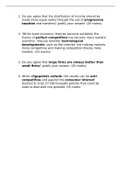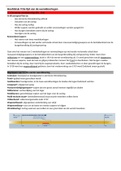1. Do you agree that the distribution of income should be
made more equal solely through the use of progressive
taxation and transfers? Justify your answer. (25 marks)
2. 'While some economic theories become outdated, the
theory of perfect competition has become more realistic
overtime.' Discuss whether technological
developments, such as the internet, are making markets
more competitive and making competition theory more
realistic. (25 marks)
3. Do you agree that large firms are always better than
small firms? Justify your answer. (25 marks)
4. When oligopolists collude, the results can be anti-
competitive and against the consumer interest’
(Extract E, lines 27-28) Evaluate policies that could be
used to deal with this problem (25 marks
, Do you agree that the distribution of income should be made more equal solely through the
use of progressive taxation and transfers? Justify your answer. (25 marks)
Progressive taxation is when the proportion of income tax increases as income increases thus
the marginal rate of tax is greater than the average rate; this enables a more equal distribution
of income. However criticism could be made for the progressive taxation policy and there are
other policies which may aid in a more equal distribution of income such as the national
minimum wage and government supply-side schemes to improve education and training
Firstly progressive taxation closes the wealth gap as when income increases so does the tax rate.
For example in the UK the lowest band with earnings up to £32,000 are taxed at 20% whereas
the highest income band earning over £150,000 are taxed at 45%. Consequently this
redistributes income with more equality and gives the government higher tax revenues, some
transferring in the forms of welfare spending therefore closing the income and wealth gap.
However, it can be argued that it is unfair for the higher income earners to be taxed harshly only
for their income to be distributed to lower income earners as welfare benefits. This may create
disincentives for people to aim for high income jobs or become entrepreneurs, typically
requiring greater skill and qualifications, as a large quantity of the income will be taxed away; by
extension this will decrease the UK’s competitiveness and wealth compared with other
countries in the long run. Thus it can be considered that progressive taxation and transfers
should not be the sole instrument for a fairer distribution of income. A system of regressive
taxation maybe considered for example VAT where the tax added on items is fixed (currently at
20%) for all income earners, though this may be considered unfair to the low income earners.
Progressive and regressive taxation discourages the equity concept whereby distribution is fair
and just as it can be argued that for example a window cleaner should not be earning as much
as a surgeon thus progressive taxation can be considered as not a fair system. However equity
carries a value judgement as there may be conflicting opinions on what ‘fair’ is.
The National Minimum Wage must also be considered; in the UK the NMW is currently at £6.31
per hour for those who are aged 21 or over. Higher income will suggest higher tax revenues and
national insurance contributions for the government. This policy suggests that all workers must
be paid a bare minimum of £6.31 (a substantial increase since the introduction of the national
minimum wage at £3.60 per hour in 1999) and therefore closes the income gap. Additionally the
national minimum wage will further encourage more unemployed workers to work at the
increased going wage rate thus will reduce workers falling into the unemployment trap
(whereby benefits outweighs thus erode any motivation to go to work). As illustrated in the
diagram above, the national minimum wage will increase wages from ‘W’ to ‘NMW’ however
this illustrates there is trade-off between higher wages and employment, as firms are unwilling
to hire more than ‘Q1’ at the ‘NMW’ wage rate and as more workers are willing to work at the
made more equal solely through the use of progressive
taxation and transfers? Justify your answer. (25 marks)
2. 'While some economic theories become outdated, the
theory of perfect competition has become more realistic
overtime.' Discuss whether technological
developments, such as the internet, are making markets
more competitive and making competition theory more
realistic. (25 marks)
3. Do you agree that large firms are always better than
small firms? Justify your answer. (25 marks)
4. When oligopolists collude, the results can be anti-
competitive and against the consumer interest’
(Extract E, lines 27-28) Evaluate policies that could be
used to deal with this problem (25 marks
, Do you agree that the distribution of income should be made more equal solely through the
use of progressive taxation and transfers? Justify your answer. (25 marks)
Progressive taxation is when the proportion of income tax increases as income increases thus
the marginal rate of tax is greater than the average rate; this enables a more equal distribution
of income. However criticism could be made for the progressive taxation policy and there are
other policies which may aid in a more equal distribution of income such as the national
minimum wage and government supply-side schemes to improve education and training
Firstly progressive taxation closes the wealth gap as when income increases so does the tax rate.
For example in the UK the lowest band with earnings up to £32,000 are taxed at 20% whereas
the highest income band earning over £150,000 are taxed at 45%. Consequently this
redistributes income with more equality and gives the government higher tax revenues, some
transferring in the forms of welfare spending therefore closing the income and wealth gap.
However, it can be argued that it is unfair for the higher income earners to be taxed harshly only
for their income to be distributed to lower income earners as welfare benefits. This may create
disincentives for people to aim for high income jobs or become entrepreneurs, typically
requiring greater skill and qualifications, as a large quantity of the income will be taxed away; by
extension this will decrease the UK’s competitiveness and wealth compared with other
countries in the long run. Thus it can be considered that progressive taxation and transfers
should not be the sole instrument for a fairer distribution of income. A system of regressive
taxation maybe considered for example VAT where the tax added on items is fixed (currently at
20%) for all income earners, though this may be considered unfair to the low income earners.
Progressive and regressive taxation discourages the equity concept whereby distribution is fair
and just as it can be argued that for example a window cleaner should not be earning as much
as a surgeon thus progressive taxation can be considered as not a fair system. However equity
carries a value judgement as there may be conflicting opinions on what ‘fair’ is.
The National Minimum Wage must also be considered; in the UK the NMW is currently at £6.31
per hour for those who are aged 21 or over. Higher income will suggest higher tax revenues and
national insurance contributions for the government. This policy suggests that all workers must
be paid a bare minimum of £6.31 (a substantial increase since the introduction of the national
minimum wage at £3.60 per hour in 1999) and therefore closes the income gap. Additionally the
national minimum wage will further encourage more unemployed workers to work at the
increased going wage rate thus will reduce workers falling into the unemployment trap
(whereby benefits outweighs thus erode any motivation to go to work). As illustrated in the
diagram above, the national minimum wage will increase wages from ‘W’ to ‘NMW’ however
this illustrates there is trade-off between higher wages and employment, as firms are unwilling
to hire more than ‘Q1’ at the ‘NMW’ wage rate and as more workers are willing to work at the





